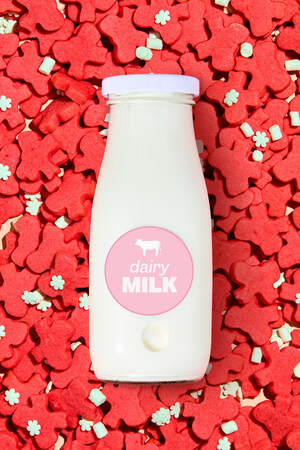Role Modeling Summit Explores Crucial Link Between Mothers, Daughters, Food and Health
Nutrition and Health Experts Convene to Reinforce the Powerful Responsibility Mothers Have as Nutrition Role Models for Their Daughters
WASHINGTON, April 27, 2011 /PRNewswire/ -- It is common knowledge that mothers can pass along genetic traits to their daughters – body shape, hair and eye color. But moms may not realize their powerful influence as role models for their daughters' physical activity, dieting behaviors, body image and self-esteem, according to a panel of experts at the Role Modeling Health Legacy Summit, hosted by the National Milk Mustache got milk?® Campaign and Family Circle magazine.
Research suggests that mothers have a unique opportunity – and a powerful responsibility – to influence the next generation of women. With awareness, knowledge and skills, mothers can pass on a new legacy of healthier food and beverage choices, body relationships and increased physical activity to daughters, granddaughters and all future generations of women.
Bringing together an esteemed panel of moms, daughters and health experts including former First Daughter Jenna Bush Hager and Linda Fears, Editor-in-Chief of Family Circle, the Summit explored the substantial body of scientific evidence documenting a mother's impact as a "healthy behaviors" role model.
"As moms, we need to realize how much influence we have, especially in helping our daughters establish healthy relationships with food," said Fears, Editor in Chief of Family Circle—which reaches more than 20 million women monthly—and mother of three, including one daughter. "From the food and beverages we put on the table to our own relationship with weight and eating, moms are powerful role models for a generation of healthier girls."
Like Mother, Like Daughter
Daughters look at their moms' own food-related attitudes and behaviors to decide what to put on their plates – and in their glasses – at meal time, according to research presented by panel members: pediatrician Alanna Levine, MD, Fellow for the American Academy of Pediatrics and mother of two; Jeannette Torres-Alvarez, an early childhood expert and mother of two, and registered dietitian Elizabeth Ward, MS, RD, a mother of three and author of several books on children's nutrition.
Increasingly, research is focusing on the uniquely powerful influence a mother has on her daughter. Key findings from the Summit include moms' influence on:
- Nutritious Eating: Children can easily pick up the eating practices of their parents – good or bad. Studies show that a mother's decision to drink milk more frequently and to eat more fruits, vegetables and whole grains helps influence her daughter's choices. In particular, research suggests that moms who drink milk are likely to have daughters who drink milk. This influence has been shown throughout childhood, but the impact appears to be the strongest in the early years of her daughter's life. "The bottom line is that if a mother wants her daughter to eat nutritious foods, drink milk instead of sugary sodas and avoid fad diets, she needs to do the same," according to panel member Elizabeth Ward, MS, RD, mother, child nutrition expert and author of THE COMPLETE IDIOT'S GUIDE TO FEEDING YOUR BABY AND TODDLER.
- Physical Activity: "Mothers can also play a positive role in influencing their daughters' activity level – both by explicit modeling of behavior and logistical or tangible support, such as providing transportation to activities," said panel member and pediatrician Alanna Levine, MD. Providing this support may be especially important for young girls who do not perceive themselves as being athletic.
- Dieting Behaviors: Mothers may unknowingly pass on poor body image and weight worries to their daughters. Studies have found that weight-related issues of parents, particularly mothers, are transmitted to their children.
- Body Image and Self Esteem: Research shows that early awareness of body weight is associated with a low self-worth in girls as young as 5 years of age. Concerns about weight can affect a child's self-esteem and wellbeing. Adolescent girls who perceive that their mother is frequently trying to lose weight are more likely to be preoccupied with weight themselves and more likely to become constant dieters.
Celebrity Mom Helps Shine Spotlight on Milk Role Modeling
A new ad featuring actress and two-time Milk Mustache celebrity Angie Harmon and her three daughters helps emphasize the important role a mom can have on her daughter's health and nutrition. The print copy reads:
Crowd-pleaser. My favorite fans always want to do what I'm doing. So when it comes to getting essential nutrients, I set the example by pouring one more serving of milk a day. One more for me. One more for them. There, everybody's happy.
"I'm so proud my family is a part of a campaign that promotes what a positive influence mom can play in her child's life," said Harmon. "A mom is most often the largest role model in her daughter's life and has tremendous power to influence their health and nutrition. Something as simple as watching mom drink a glass of lowfat milk can help influence her kids' beverage choices in a positive way."
On average, Americans today are drinking only about a single serving of milk each day – falling far short of the recommended three 8-ounce servings of lowfat or fat free milk and milk products (or two servings for children ages eight and younger).
Many families in this country fail to get the recommended three glasses of milk daily, which means they're missing out on vital nutrients. Something as simple as moms pouring one more serving of lowfat milk for themselves and their family each day can help bridge the nutrient gap and build a strong family.
How Mothers Can Pass on Their Own Health Legacy
The panel of leading health and nutrition experts closed the Summit by developing recommendations to mothers:
- Eat (and Drink) Healthy Yourself. Kids will do as you do, so consume the foods and beverages that you want your children to have. Encourage lowfat or fat free milk instead of sugary drinks at every meal.
- Make Meals Matter: Make family meals a positive time for you and your kids. Avoid criticism and enjoy your time (and your food) with your family.
- Get Active: Be active to set a good example for your kids. Avoid unhealthy habits and find your family's favorite ways to be active together.
- Focus on the Positive: Avoid making negative comments about food, your body or your child's body. Boost your daughter's self-esteem by complimenting qualities beyond just appearance.
For more information on role modeling healthy behaviors, the full research in "Like Mother, Like Daughter: Exploring the Crucial Link Between Mothers, Daughters, Food and Health" and access to a special Mother's Day e-card, visit Facebook.com/MilkMustache or whymilk.com.
About the National Milk Mustache "got milk?"® Campaign
The Milk Processor Education Program (MilkPEP), Washington, D.C., is funded by the nation's milk processors, who are committed to increasing fluid milk consumption. The MilkPEP Board runs the National Milk Mustache "got milk?"® Campaign, a multi-faceted campaign designed to educate consumers about the health benefits of milk. For more information, go to facebook.com/milkmustache or whymilk.com. Deutsch, A Lowe and Partners Company, is the creative agency for the National Milk Mustache "got milk?®" Campaign.
About Family Circle
Published 15 times a year by Meredith Corporation, with a circulation of 3.8 million and 20 million readers, Family Circle is one of the most widely read monthly magazines in the world. Family Circle provides smart relevant advice, sensible solutions, and inspiration in a voice that encourages and celebrates success in its pages and online at www.familycircle.com. Family Circle has always been committed to women's issues and in 1973 became the first women's magazine to fully underwrite a professional women's sporting event, the Family Circle Cup, an annual women's tennis tournament held in April in Charleston, S.C., at Family Circle Magazine Stadium.
SELECT REFERENCES
Birch LL, Lee Y. Family influences: mothers' and daughters' use of multivitamin-mineral supplements. Nutrition Today. 2002;37:173-174.
Davison KK, Birch LL. Weight status, parent reaction and self-concept in five-year-old girls. Pediatrics. 2001;107:46-53.
Davison KK, Cutting TM, Birch LL. Parents' activity-related parenting practices predict girls' physical activity. Medicine and Science in Sports and Exercise. 2003;35:1589-1595.
Field AE, Austin B, Striegel-Moore R, Taylor B, Camargo CA, Laird N. Colditz G. Weight concerns and weight control behaviors of adolescents and their mothers. Archives of Pediatrics and Adolescent Medicine. 2005;159:1121-1126.
Fisher JO, Mitchell D, Smiciklas-Wright H, Birch LL. Maternal milk consumption predicts the tradeoff between milk and soft drinks in young girls' diets. Journal of Nutrition. 2001;131:246-250.
Fisher JO, Mitchell DC, Smiciklas-Wright H, Birch LL. Parental influences on young girls' fruit and vegetable, micronutrient, and fat intakes. Journal of the American Dietetic Association. 2002;102:58-64.
Grove TM, Douglass JS, Heimbach JT, DiRienzo, Miller GD. Evaluation of maternal consumption of dairy products and its influence upon daughters' diets. FASEB Journal 1999;13:A549.
Johnson RK, Panely CV, Wang MQ. Associations between the milk mothers drink and the milk consumed by their school-aged children. Family Economics and Nutrition Review. 2001;13:27-36.
SOURCE MilkPEP
WANT YOUR COMPANY'S NEWS FEATURED ON PRNEWSWIRE.COM?
Newsrooms &
Influencers
Digital Media
Outlets
Journalists
Opted In






Share this article